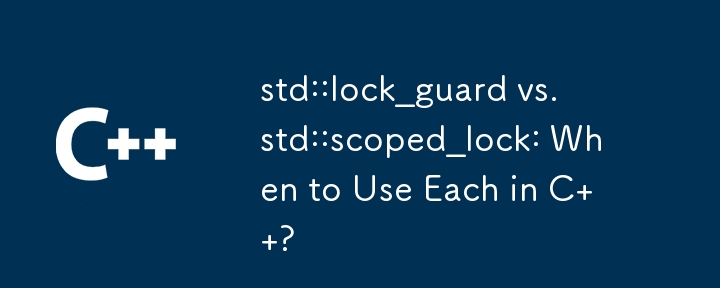
std::lock_guard vs. std::scoped_lock: When to Use Each?
C 17 introduced the new std::scoped_lock class, raising questions about its relationship with the existing std::lock_guard. This article sheds light on the differences and provides guidance on their appropriate usage.
Differences and Usage Scenarios
While both classes provide thread synchronization by locking and unlocking mutexes, they have key distinctions:
-
Number of Mutexes: std::lock_guard can lock only one mutex at a time, while std::scoped_lock supports locking multiple mutexes concurrently.
-
Exception Safety: Both classes ensure exception safety by automatically releasing locks when an exception is thrown. However, std::scoped_lock allows for the possibility of manually unlocking within the guarded scope using its unlock method.
-
Syntax: std::lock_guard requires explicit specification of the mutex to be locked, e.g., { std::lock_guard lock(mutex); }, while std::scoped_lock simplifies the syntax by allowing variable-length mutex lists, e.g., { std::scoped_lock lock{mutex1, mutex2}; }.
Recommendations
Based on these differences, it is recommended to use:
-
std::lock_guard for situations where only one mutex needs to be locked for the duration of the guarded scope. Its concise syntax and compile-time error detection make it safer for simple locking scenarios.
-
std::scoped_lock for cases where multiple mutexes need to be locked or where unlocking within the scope is necessary. Its flexibility and variable-length support make it suitable for complex locking scenarios.
-
std::unique_lock for cases where unlocking within the scope is required or for use with condition variables.
Conclusion
std::lock_guard and std::scoped_lock offer distinct features for thread synchronization. By understanding their differences and following the recommended usage guidelines, developers can effectively handle multithreaded scenarios in C applications.
The above is the detailed content of std::lock_guard vs. std::scoped_lock: When to Use Each in C ?. For more information, please follow other related articles on the PHP Chinese website!






